Nigeria: Unprecedented flooding renders 431 dead, 42 million homeless! President calls floods a 'national disaster'! This is worst flooding in decades!
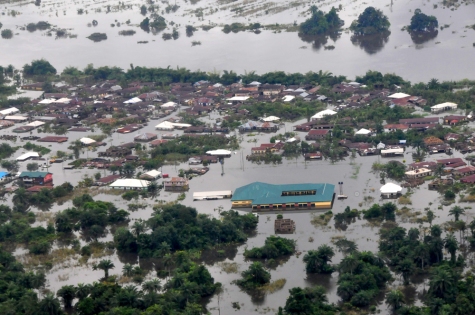













 Map of floods situation in West & Cnetral Africa. 3 million aff...
Map of floods situation in West & Cnetral Africa. 3 million aff...
NASA Earth observatory -
Nigeria:
/ As the world marks International Day for the Eradication of Poverty today, flood which has been ravaging many states of the country since August has worsened the incidence of poverty in Nigeria, the world's largest black nation.
Currently, the flood, which has affected five of the six geo-political zones of the country, has in the estimation of President Goodluck Jonathan rendered 25 per cent of Nigerians homeless. With a population of 167 million, it means that about 42 million persons have been displaced from their homes with large tracks of farmlands and means of livelihood destroyed. States affected by the flood include Anambra, Imo, Delta, Bayelsa, Rivers, Edo, Kogi, Benue, Taraba, Adamawa, Bauchi, Kano, Niger, Kaduna,
On Monday President Goodluck Jonathan's Otuoke, Ogbia, Bayelsa State home was submerged along side over 80 per cent of the state. For close to two weeks, the president has been traversing the nook and crannies of the country ravaged by the flood of fury. Last Thursday he raised a National Committee on Flood Relief and Rehabilitation to raise fund to augment government's efforts at mitigating the pains of the flood and bring succour to victims. /
/ Nigerian President Goodluck Jonathan on Thursday visited some of the hundreds of thousands of people made homeless by the country's worst flooding in at least five decades, calling it a 'national disaster'. Vast stretches of Africa's most populous nation have been submerged by floods in the past few weeks, as major rivers like the Niger, the continent's third longest, burst their banks /
/ Some 1.3 million Nigerians have been displaced and 431 have died in what the authorities say is the worst flooding in over 40 years, with 30 of the country’s 36 states affected since July, according to the National Emergency Management Agency (NEMA). Heavy rain has submerged much of Delta and Bayelsa states in the southwest, affecting some 350 communities and making 120,000 people homeless, according to the state authorities and the Nigerian Red Cross (NRC).
Flooding started in Plateau State in central Nigeria in July, spread through Borno, Cross River, Ebonyi, Nassarawa, Bauchi, Gombe, Katsina and Kebbi states in August, hit Taraba Benue, Niger, Kaduna and Kano in September, before affecting Delta and Bayelsa states in September and October. /
---------------------------------------
Nigeria: World Poverty Day - Poverty Worsens As Flood Renders 42 Million
Lagos — As the world marks International Day for the Eradication of Poverty today, flood which has been ravaging many states of the country since August has worsened the incidence of poverty in Nigeria, the world's largest black nation.
Currently, the flood, which has affected five of the six geo-political zones of the country, has in the estimation of President Goodluck Jonathan rendered 25 per cent of Nigerians homeless. With a population of 167 million, it means that about 42 million persons have been displaced from their homes with large tracks of farmlands and means of livelihood destroyed.
States affected by the flood include Anambra, Imo, Delta, Bayelsa, Rivers, Edo, Kogi, Benue, Taraba, Adamawa, Bauchi, Kano, Niger, Kaduna,
On Monday President Goodluck Jonathan's Otuoke, Ogbia, Bayelsa State home was submerged along side over 80 per cent of the state.
For close to two weeks, the president has been traversing the nook and crannies of the country ravaged by the flood of fury. Last Thursday he raised a National Committee on Flood Relief and Rehabilitation to raise fund to augment government's efforts at mitigating the pains of the flood and bring succour to victims.
Led by business magnate, Alhaji Aliko Dangote and former President of the Nigerian Bar Association, Mr. Olisa Agbakoba, SAN, with Chairman of Globacom, Dr. Mike Adenuga Jnr as Chief Fund Mobiliser, the committee is expected to raise N100 billion to augment the N17.6 billion the government has released.
Speaking at the Presidential Villa, Abuja while inaugurating the committee, President Jonathan regretted that no fewer than 25 per cent Nigerians had been displaced by the flood disaster.
He said since those saddled with the responsibility of compiling data on the victims were still working, there was possibility that the figure might be higher.
He lamented that some states of the federation, including his home home state Bayelsa, are currently about 80 per cent submerged.
The International Day for the Eradication of Poverty has been observed every year since 1993, when the General Assembly, by resolution 47/196, designated October 17 to promote awareness of the need to eradicate poverty and destitution in all countries, particularly in developing countries-a need that has become a development priority.
At the Millennium Summit, world leaders committed themselves to cutting by half by the year 2015 the number of people living in extreme poverty - people whose income is less than one dollar a day.
The theme for this year's International Day for the Eradication of Poverty - "Working together out of poverty" - highlights the need for a truly global anti-poverty alliance, one in which both developed and developing countries participate actively.
http://allafrica.com/stories/201210170909.html
^^^^^^^^^^^^^^^^^^^^^^^^^^
Nigeria president calls floods a "national disaster"
LOKOJA, Nigeria (Reuters) - Nigerian President Goodluck Jonathan on Thursday visited some of the hundreds of thousands of people made homeless by the country's worst flooding in at least five decades, calling it a 'national disaster'.
Vast stretches of Africa's most populous nation have been submerged by floods in the past few weeks, as major rivers like the Niger, the continent's third longest, burst their banks.
At least 140 people have been killed, hundreds of thousands uprooted and tens of thousands of hectares of farmland have been submerged since the start of July, raising concerns about food security, the National Emergency Management Agency (NEMA) said.
In Kogi, a northern state that has been the worst affected and which Jonathan visited on Thursday, NEMA state coordinator Ishaya Chonoko said 623,900 people had been displaced and 152,575 hectares of farmland destroyed so far.
"We are very sad over these flood incidences in the country. It is a national disaster," Jonathan said with a sombre expression, after casting an eye over the makeshift displacement camp huddling 738 people together in Dankolo primary school.
"We are thinking of how to settle you all back to your places after the floods. Government is doing everything possible to cushion the effects on you ... it will soon be over."
Nigeria, which gets heavy tropical rains from May to September, usually suffers from seasonal flash floods but almost never on this scale. Floods have also devastated the Niger Delta, home to Africa's biggest energy industry, where the Niger river fans into creeks before emptying itself into the Atlantic.
There has been no reported impact on crude oil production, but a cocoa industry body said last month that cocoa output would fall far short of a 300,000 tonne target for last season.
"I have lost all hope in life, because I lost all that I had," said victim Dan Musa Mosiji, but he added that he was comforted by government reassurances that he could be resettled.
As images have trickled out of stranded villagers perched on rooftops and fuel trucks washed onto their sides, pressure has mounted for the government to act, and it has pledged millions of dollars for relief efforts.
"Our major problem here is that we don't have accommodation for all the victims. They are crammed into this small school," said Red Cross coordinator of the camp, Jubril Ebiloma, as families squeezed together in a classroom behind her.
http://thestar.com.my/news/story.asp?file=/2012/10/12/worldupdates/...
^^^^^^^^^^^^^^^^^^^^^^^^^^^^^^^^^
NIGERIA: Worst flooding in decades
WARRI/LAGOS, 10 October 2012 (IRIN) - Some 1.3 million Nigerians have been displaced and 431 have died in what the authorities say is the worst flooding in over 40 years, with 30 of the country’s 36 states affected since July, according to the National Emergency Management Agency (NEMA).
Heavy rain has submerged much of Delta and Bayelsa states in the southwest, affecting some 350 communities and making 120,000 people homeless, according to the state authorities and the Nigerian Red Cross (NRC).
Flooding started in Plateau State in central Nigeria in July, spread through Borno, Cross River, Ebonyi, Nassarawa, Bauchi, Gombe, Katsina and Kebbi states in August, hit Taraba Benue, Niger, Kaduna and Kano in September, before affecting Delta and Bayelsa states in September and October.
Thousands of people who had sheltered in dozens of temporary displacement sites in Delta and Bayelsa states have had to flee once again as they have been flooded, forcing agencies to build new ones on higher ground.
In Bayelsa’s capital, Yenagoa, 3,000 people are sleeping in the Ovom State Sports Complex.
Thousands of houses, some 20 health clinics and five hospitals, as well as dozens of schools, churches and government buildings have been destroyed or damaged in Delta State. Six of Bayelsa’s eight districts were flooded, according to Emenike Umesi, NEMA’s zonal coordinator in Port Harcourt.
Most of the schools in the affected area are closed or currently occupied by internally displaced persons (IDPs).
It is not yet known how many hectares of crops have been destroyed but many farmers told IRIN they had lost everything - including this year’s yam, cassava and cocoa yam crop - while most of the fisheries were also flooded. “All my sources of livelihood are destroyed… I am pleading with the federal government to compensate us and find a lasting solution to the flood menace,” said Philip Ofodemu, a farmer from the Kwele community in Delta State.
“Overwhelmed”
Aid agencies have been “overwhelmed” by the extent of the damage and the response needs stronger coordination, said Abdul Mariga, an NRC disaster management coordinator.
The agency has prioritized evacuating stranded communities and providing as many tents, healthcare services and basics (such as cooking utensils) as it can from its warehouse in Lagos.
Most IDPs IRIN spoke to were in desperate need of food aid. “We have not been given food since we arrived,” said Evelyn Oyatu, who fled with her four children from Ebedebiri to Yenagoa, which itself faced severe flooding. “I’m weak. The state government should come to our aid,” she told IRIN.
Another flood survivor in Yenagoa, Gloria Ozuo, told IRIN, crying, that she and her children had been given a small loaf of bread the day before. “We die for hungry here,” she told IRIN.
NEMA’s Umesi promised food aid would arrive soon.
On 9 October President Goodluck Jonathan allocated 17.6 billion naira (US$111 million) to states and agencies to respond to flood damage and set up a committee to lead flood relief and rehabilitation efforts.
Several international NGOs, including Oxfam, have launched responses, while NRC, responding in 10 states, is appealing for US$850,000 to boost its efforts.
Unprepared
Many displaced residents are also angry the government has not done more to prevent flooding which occurs every year during the August to October rainy season in these low-lying, flat states intersected by swamps, creeks and rivers.
Bayelsa and Delta States have the country’s largest supplies of crude oil, yet residents have complained bitterly for decades that oil wealth has not gone into improved development in the area.
In August the Nigerian Meteorological Agency (NIMET) predicted heavy rains this year, warning local authorities and residents to keep drainage ditches clear, but as usual, warnings were either ignored or not taken seriously, said NIMET director Anthony Anuforo.
Seriake Dickson, governor of Yenagoa, pushed the authorities to unblock drainage channels there, significantly lowering the impact of flooding this year, he said. But few other towns did the same.
In Bayelsa, many residents are angry that the Niger Delta Development Commission (NDDC), set up in 2000 to boost development and ecological health in Delta State, has not worked on dredging and sand-filling flood-prone areas.
“Until we use funds accruing from the crude oil to address this kind of environmental challenge for the common good, the government will not be seen as responsive and citizens cannot remain loyal or patriotic,” Alagoa Morris, project officer with the Environmental Rights Action group, told IRIN.
NDDC’s director could not be reached as he had been displaced. Meanwhile with more rains predicted, more flooding is expected.
http://www.irinnews.org/Report/96504/NIGERIA-Worst-flooding-in-decades
^^^^^^^^^^^^^^^^^^^^^^^^^^^^^^^
Comment
-
Comment by Kojima on November 7, 2012 at 12:49pm
-
Nigeria Floods Situation Report No. 1 (as of 06 November 2012) [ReliefWeb: 07 Nov 2012]
Highlights
* Nigeria is currently experiencing the worst flooding in more than 40 years.
* Between July and the end of October, 7,705,378 people have been affected by the floods and 2,157,419 have registered as IDPs at some moment; 363 people are reported dead, more than 618,000 houses have been damaged or destroyed; 33 States out of 36 are affected.
* Flood are now slowly receding.
* A Presidential Committee on Flood relief and Rehabilitation was established, which includes members of the private sector. The President announced $110 million of federal funds.
* Based on the result of an Interagency assessment in 14 most affect states, the humanitarian community has presented an initial $38 million plan.
Situation Overview
Nigeria is currently experiencing the worst flooding in more than 40 years as a result of heavy rainfalls in the country, the downstream move of the Niger River floods that previously affected Niger and Benin, and the release of water from dams, including the Ladgo dam in Cameroon during the last week of August.
According to the latest figures provided by the National Emergency Management Agency (NEMA) 7,705,378 people have been affected by the floods in Nigeria between July and 31 October, and 2,157,419 have registered as IDPs at some moment to receive assistance. This means that the number of persons currently sheltered in sheltering structures, including schools, may be significantly lower, since many people are living with host families and other have already returned home. A total of 363 people are reported dead and over 18,200 have been injured. More than 618,000 houses have been destroyed or damaged.
Out of the 36 states of the country, 33 are affected, including 14 that are considered severely affected. A total of 256 Local Government areas (LGAs – subdivisions of the states) and 3,870 communes are affected.The state of Kogi has recorded the highest number of affected people (1.35 million) followed by Adamawa (1.11 million) and Delta (785,000).
Floods are now slowly receding, starting from upstream states. The Nigeria hydrological services agency (NIHSA) has announced that the level of the Niger River in Lokoja was at 8.83 meters on 1 November, while it peaked at12.84 meters on 29 September. The discharge of the Niger has dropped from 31,692 cubic meters per second on 29 September to 17,722 cubic meters per second on 1 November. The National meteorological agency has announced additional rains until December, but added they should not result in additional flooding.
See also;
* 7 of 10 SINKING & Africa Roll; Thailand SINKING: 10 province fl...
* Nigeria: This is worst floods since 1936! Two million affected by f...
* 7 of 10 SINKING & Africa Roll; India: floods in North-east kill...
* West and Central Africa - Flood Impact Profile (as of 17 Sep 2012)
-
Comment by Howard on October 21, 2012 at 10:14pm
-
This extreme flooding and the MODIS comparison images provide compelling evidence of the unfolding African Roll. Well done, Stanislav.
"As Africa rolls, the top and bottom part of the continent are tugged in different directions, pulling the continent apart somewhat at Nigeria. Hold the top part of Africa firmly in your left hand, and grasp and pull the bottom part toward the east with your right hand, and you can sense what is happening there, at Nigeria." ZetaTalk Newsletter Issue 275
SEARCH PS Ning or Zetatalk
This free script provided by
JavaScript Kit
Donate
© 2025 Created by 0nin2migqvl32.
Powered by
![]()
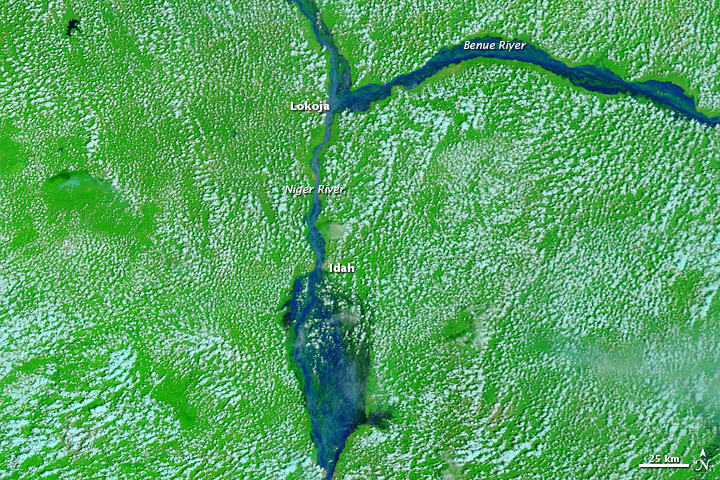
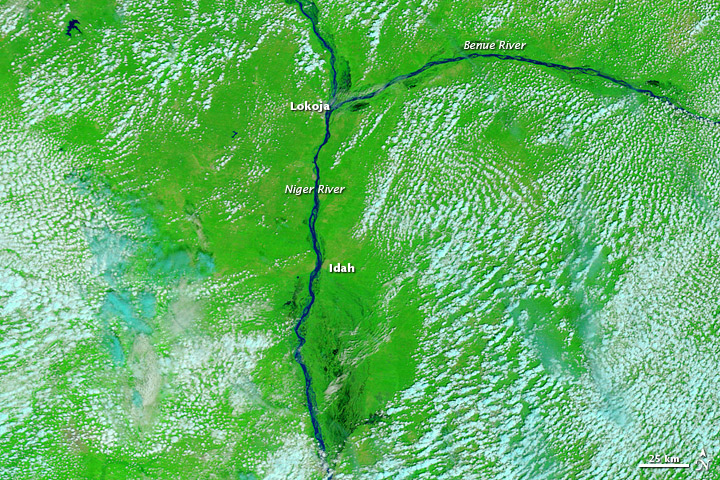
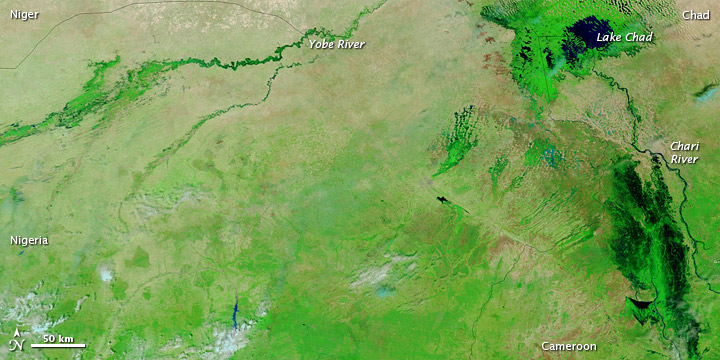
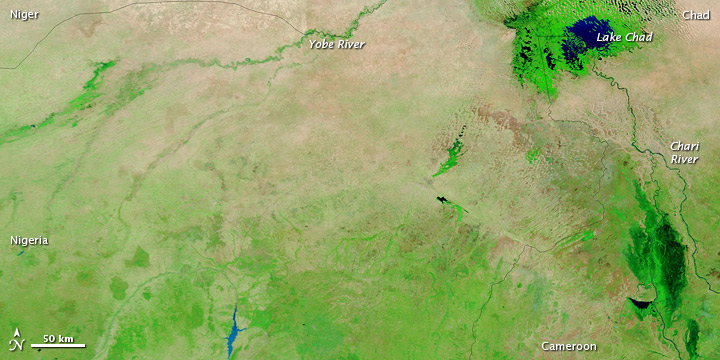
You need to be a member of Earth Changes and the Pole Shift to add comments!
Join Earth Changes and the Pole Shift